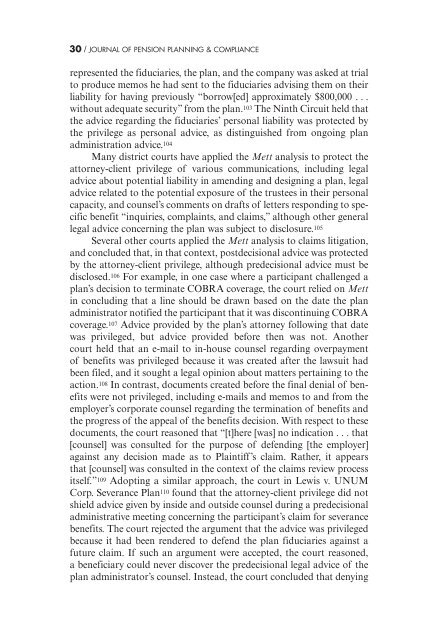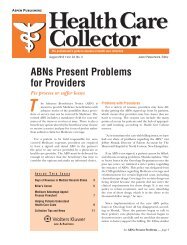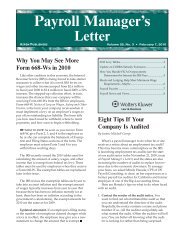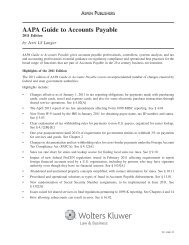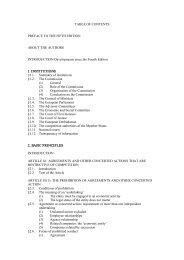journal of pension planning & compliance - Kluwer Law International
journal of pension planning & compliance - Kluwer Law International
journal of pension planning & compliance - Kluwer Law International
You also want an ePaper? Increase the reach of your titles
YUMPU automatically turns print PDFs into web optimized ePapers that Google loves.
30 / JOURNAL OF PENSION PLANNING & COMPLIANCE<br />
represented the fiduciaries, the plan, and the company was asked at trial<br />
to produce memos he had sent to the fiduciaries advising them on their<br />
liability for having previously “borrow[ed] approximately $800,000 . . .<br />
without adequate security” from the plan. 103 The Ninth Circuit held that<br />
the advice regarding the fiduciaries’ personal liability was protected by<br />
the privilege as personal advice, as distinguished from ongoing plan<br />
administration advice. 104<br />
Many district courts have applied the Mett analysis to protect the<br />
attorney-client privilege <strong>of</strong> various communications, including legal<br />
advice about potential liability in amending and designing a plan, legal<br />
advice related to the potential exposure <strong>of</strong> the trustees in their personal<br />
capacity, and counsel’s comments on drafts <strong>of</strong> letters responding to specific<br />
benefit “inquiries, complaints, and claims,” although other general<br />
legal advice concerning the plan was subject to disclosure. 105<br />
Several other courts applied the Mett analysis to claims litigation,<br />
and concluded that, in that context, postdecisional advice was protected<br />
by the attorney-client privilege, although predecisional advice must be<br />
disclosed. 106 For example, in one case where a participant challenged a<br />
plan’s decision to terminate COBRA coverage, the court relied on Mett<br />
in concluding that a line should be drawn based on the date the plan<br />
administrator notified the participant that it was discontinuing COBRA<br />
coverage. 107 Advice provided by the plan’s attorney following that date<br />
was privileged, but advice provided before then was not. Another<br />
court held that an e-mail to in-house counsel regarding overpayment<br />
<strong>of</strong> benefits was privileged because it was created after the lawsuit had<br />
been filed, and it sought a legal opinion about matters pertaining to the<br />
action. 108 In contrast, documents created before the final denial <strong>of</strong> benefits<br />
were not privileged, including e-mails and memos to and from the<br />
employer’s corporate counsel regarding the termination <strong>of</strong> benefits and<br />
the progress <strong>of</strong> the appeal <strong>of</strong> the benefits decision. With respect to these<br />
documents, the court reasoned that “[t]here [was] no indication . . . that<br />
[counsel] was consulted for the purpose <strong>of</strong> defending [the employer]<br />
against any decision made as to Plaintiff’s claim. Rather, it appears<br />
that [counsel] was consulted in the context <strong>of</strong> the claims review process<br />
itself.” 109 Adopting a similar approach, the court in Lewis v. UNUM<br />
Corp. Severance Plan 110 found that the attorney-client privilege did not<br />
shield advice given by inside and outside counsel during a predecisional<br />
administrative meeting concerning the participant’s claim for severance<br />
benefits. The court rejected the argument that the advice was privileged<br />
because it had been rendered to defend the plan fiduciaries against a<br />
future claim. If such an argument were accepted, the court reasoned,<br />
a beneficiary could never discover the predecisional legal advice <strong>of</strong> the<br />
plan administrator’s counsel. Instead, the court concluded that denying


